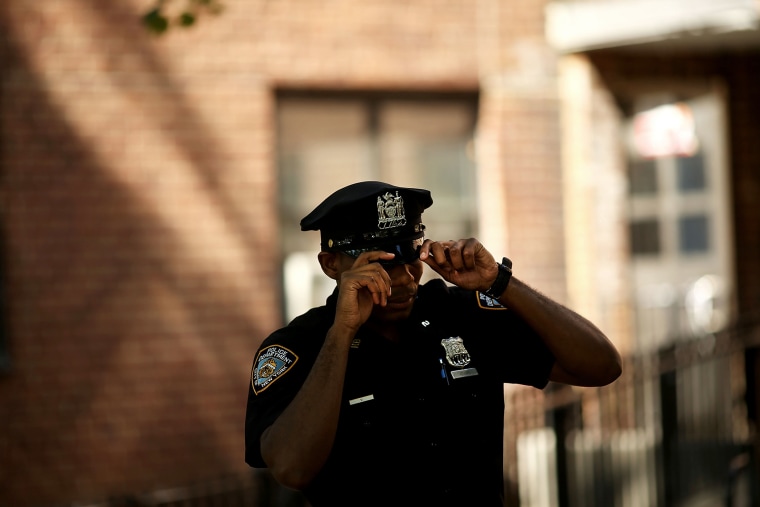Two major U.S. cities announced Thursday that they are moving forward with efforts to arm police with body cameras, to improve accountability and transparency.
The announcements come on the heels of the death of Michael Brown, an 18-year-old, unarmed black man, who was shot and killed by Darren Wilson, a white police officer in Ferguson, Missouri.
Outraged protesters clashed with police after eyewitness accounts of Brown's death emerged, conflicting with the narrative offered by the authorities. A grand jury is currently hearing evidence in the case against Wilson and will decide whether or not to charge him with a felony.
Houston’s Police Chief Charles McClelland has asked his city's government for $8 million to fund 3,500 police officers’ body cameras over three years, following a successful pilot program last year that participating officers said pushed the police to act more professionally, according to the Houston Chronicle.
New York City Police Commissioner Bill Bratton announced Thursday that his department is “actively looking” at providing officers with body cameras, amNewYork reported. It’s a big step for the largest police force in the country, which has struggled with accusations of racial profiling, particularly over its past stop-and-frisk policy, which both research studies and courts have found targeted minorities disproportionately. More recently, the choking death of Eric Garner, a Staten Island man accused of peddling illegal cigarettes, at the hands of the NYPD, has caused widespread controversy and earned national news coverage. Last week, thousands—galvanized by Brown’s death—gathered to protest.
“It's a technology that I support strongly," Bratton told reporters at police headquarters.
A pilot program was ordered last year when a federal judge ruled against stop-and-frisk. Mayor Bill de Blasio said the program will help the city move forward with implementation.
"It's going to tell us whether it's something we can use on a bigger scale or it's something that's going to take a lot more time to use on a bigger scale. We're going to have to find that out objectively," the mayor said. "But we're absolutely committed to the pilot. We think there's real promise there."
Officers in South Carolina’s capital also announced earlier this week they’d begin testing body cameras. "The public gets to see what I see which is a benefit for everyone," Columbia’s Lt. Joseph Rowson told local network WLTX.
The three cities join a handful of early adopters: Roughly 30 Los Angeles officers are testing various camera models and plan to purchase 500 cameras for their force.
Washington state’s Spokane police department decided to purchase 220 body cameras last fall, prompted by community outrage over an officer who beat a mentally-ill man to death in 2006.
Since Brown's death, there has been mounting support for police cameras.
More than 150,000 people have signed a White House petition calling on Congress to pass a “Mike Brown law” that would require state, county and local police to wear cameras. Missouri’s Sen. Claire McCaskill and other members of Congress have called for body cameras, too, with McCaskill suggesting tying federal funding to the use of body cameras.
Advocates of cameras point to Rialto, a small community in California, where a man was shot and wounded in 2011 by police. Witnesses claimed he wasn’t armed and outrage in the community grew, but the officer was wearing a camera and the footage showed the suspect running and waving a handgun. According to The Los Angeles Times, complaints of police abuse plummeted once officers were outfitted with cameras—something advocates say offsets the cost of the cameras.
Still, there are added implications that police forces have weighed, like how much and what footage the public will be allowed to access and how informants and others could react when they realize their statements are being recorded.
